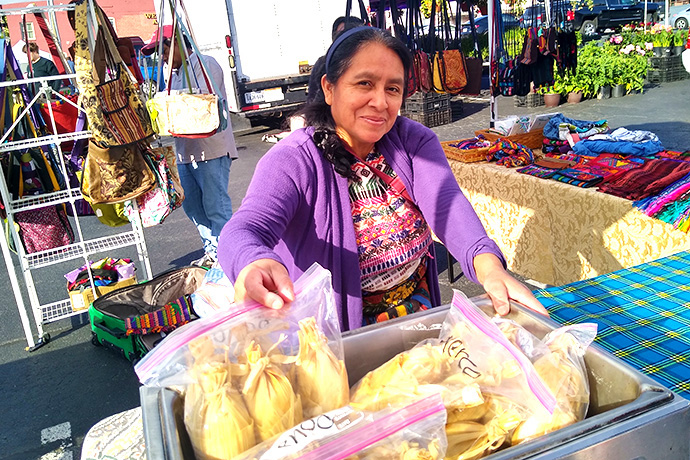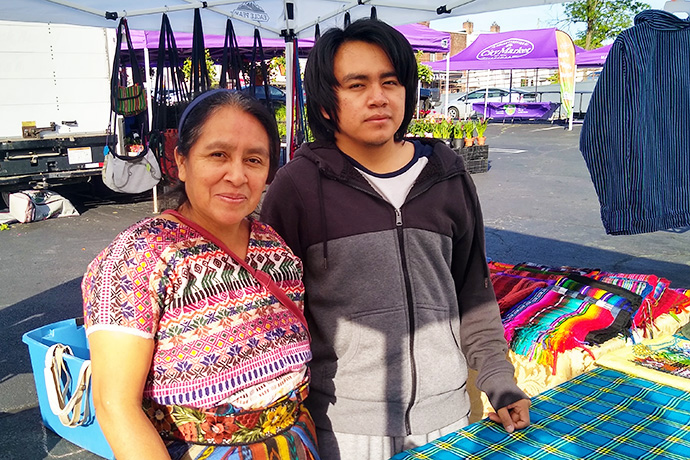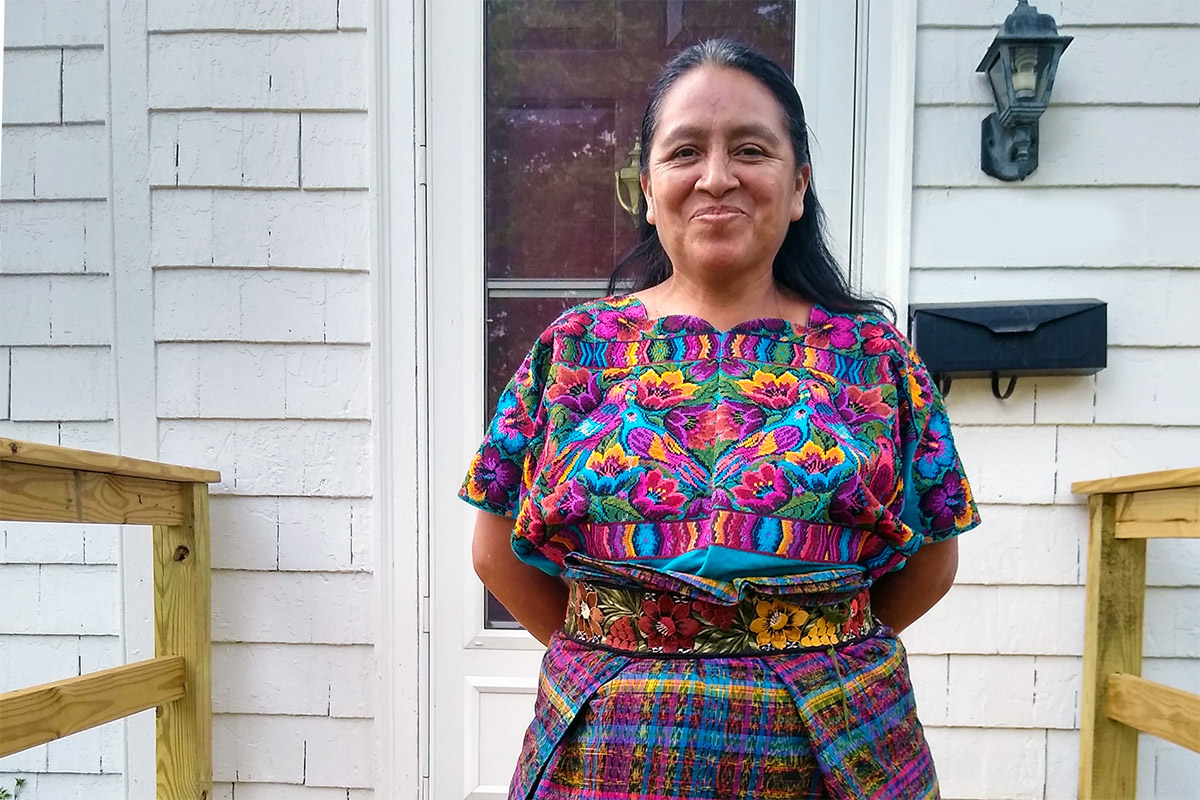Key points:
- Care and support from Wesley Memorial United Methodist Church has helped Guatemalan mother reach her goals, including reuniting with her children, working and learning to drive.
- Maria Chavalan Sut, now 49, fled her native Guatemala in 2015 after her house was burned in an attempt to force her to relinquish her land.
- In 2021, Chavalan Sut received a Stay of Removal, a government order that protects her from deportation. She is awaiting a ruling in her asylum case.
- The Rev. Matt Seaton, pastor at Wesley Memorial United Methodist Church, said Chavalan Sut’s impact on the church has been profound, adding a new dimension to its mission.
Maria Chavalan Sut feels liberated thanks to her church family.
After three years in sanctuary at Wesley Memorial United Methodist Church, Chavalan Sut has been freed from many of the strictures that were placed upon her as an undocumented immigrant.
“When I entered sanctuary, I had three goals,” she said. “One was to be reunited with my children; the others were to have a work permit and a driver’s license. Now, I have my children, I am working and I’m getting my driver’s license.”
She said it is the people at Wesley who helped her achieve this new life.
“Without them, I never could have been freed from the fear that I was experiencing.”

Chavalan Sut, now 49, has been seeking asylum since she fled her native Guatemala after her house was burned in 2015 in an attempt to force her to relinquish her land. As an indigenous Mayan — a group that has been repeatedly subjected to genocide — she feared that she would be killed.
“I was very scared when I left Guatemala,” Chavalan Sut said. “And I wasn’t the only one. There were millions of us living in fear in Guatemala.
“I didn’t know where I was going,” she continued. “I didn’t know how I would get there. And I didn’t know how I would survive once I got there. But I knew that I had to leave Guatemala or I would be killed. I didn’t have anyone who would protect me in Guatemala.”
She made her way to the U.S. and entered sanctuary at Wesley Memorial United Methodist Church in 2018. Fearing forced deportation by Immigration and Customs Enforcement, she lived in a small room in the church's education building and never left the grounds.
In 2021, Chavalan Sut received a Stay of Removal, a government order that protects her from deportation. The Rev. Matt Seaton, pastor at Wesley Memorial United Methodist Church, said Chavalan Sut’s stay is valid until March of next year. “The status of Maria’s asylum case is that she awaits the ruling from the 11th circuit court on her appeal,” he said.
With the assistance of the church and the Charlottesville community, Chavalan Sut has been reunited with her four children, established a microenterprise that sells tamales at the Charlottesville City Market, rented a three-bedroom house and obtained a learner’s permit to drive.
“In the Wesley sanctuary, I was able to move ahead,” she said of reaching her goals.
When the children, ages 10-25, arrived in August 2022, the entire family stayed in two rooms in the church’s education building. The children crossed the border independently, Seaton said. Today, the three younger children attend public schools and her oldest son works.
“The children came as unaccompanied minors in hope of asylum. As such, they are immigrants seeking asylum and citizenship,” Seaton said.

Chavalan Sut said she feels more secure now that she’s in a home with her family.
Seaton said the significance of the house is more than shelter.
“It’s not temporary housing. It is part of her liberation,” he said.
Chavalan Sut’s newfound freedom includes transport. She had been dependent upon church members or public transportation to shop or run errands. It would take her two hours by bus to get to Walmart, which is only 15 minutes away by car. This month, she will take the test to get her driver’s license, and Wesley Memorial has given her a van that was donated to the church.
Chavalan Sut also has traveled to attend conferences sponsored by Fe En Accion — a national support group for immigrants — in New York, Washington and Kansas City.
In May, Chavalan Sut began making and selling tamales at the City Market. The government prohibits her from obtaining a paid job, which would be reported on a W-2. However, she can work as an independent contractor and earn money for herself.
Chavalan Sut credits a support group made up of United Methodists from Wesley Memorial and others from the community in helping her get where she is today. The group has grown to 50 people, including 20 members of her host church.
Subscribe to our
e-newsletter
David Sandridge, a longtime member of Wesley Memorial, said that prior to Chavalan Sut’s arrival, the congregation expressed interest in the sanctuary movement. On a Saturday night in 2018, the Rev. Isaac Collins, the church’s pastor at the time, received a call that Chavalan Sut was in Virginia and was facing immediate deportation.
After Sunday’s church service, the church council met with a diverse group of interested people, including other churches, community members and legal counsel. The council agreed to spearhead the support group for Chavalan Sut. On Sunday evening, she arrived at Wesley Memorial.
“Given the fear of ICE finding her, we locked the entire building and assigned one person to be with her at all times,” Sandridge said. “People scrambled to get the articles that she needed immediately, such as a bed and sheets. We had to move very quickly and we did it.”
In the early days, Chavalan Sut was dependent upon the support group members. They delivered her food and anything else that she needed. While she has left sanctuary, the group remains supportive.
“Maria has become a member of our community,” Sandridge said. “I talk with her several times per week as do other support group members.”
Chavalan Sut’s impact on the Wesley community has been profound, said Seaton. The congregation developed a deeper understanding of immigration as a result of her presence, he said. While the congregation had been reconciling and welcoming, Chavalan Sut added a new dimension to its mission.
“Our church has grown rapidly,” Seaton said. “We have gone from 30 attendees at services to 60. Before Maria, we were a very sleepy, aging congregation. With the arrival of Maria, we became very active.
“I was very ecstatic to become part of a congregation that doesn’t just talk but does. We have opened the door for the community and the church to realize its progressivism.”
Chavalan Sut said she is grateful for the sacrifices the Wesley community made to help her.
“They gave me shelter and protected me from ICE. They welcomed my children when they arrived. They helped me to start my business and they are helping me to have the freedom to drive. I owe my new life to them,” Chavalan Sut said.
“They gave me connection and liberation. They saved my life. And they always accompany me, in every way.”
Lord is a photojournalist based in Ivy, Virginia.
News media contact: Julie Dwyer, news editor, newsdesk@umcom.org or 615-742-5469. To read more United Methodist news, subscribe to the free Daily or Weekly Digests.




